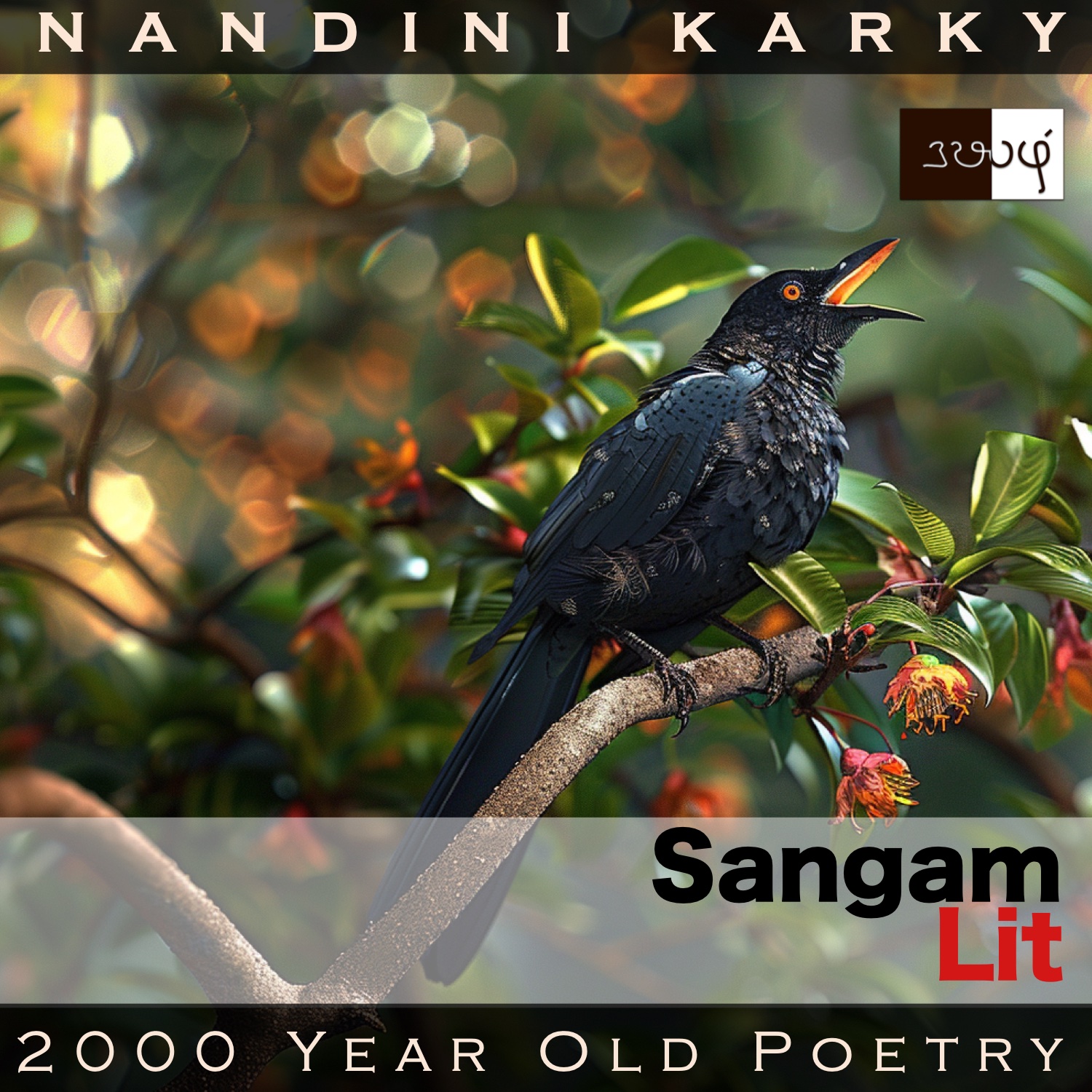Podcast: Play in new window | Download
Subscribe: Apple Podcasts | Spotify | Amazon Music | Android | iHeartRadio | TuneIn | RSS | More
In this episode, we perceive the arrival of the promised season, as portrayed in Sangam Literary work, Ainkurunooru 341-350, situated in the ‘Paalai’ or ‘Drylands landscape’ and penned by the poet Othalaanthaiyaar.

Thus spreads the Thirty Fifth Ten of Ainkurunooru: The Season of Love
341 Singing ‘Kuyil’
அவரோ வாரார்; தான் வந்தன்றே
குயில் பெடை இன் குரல் அகவ,
அயிர்க் கேழ் நுண் அறல் நுடங்கும் பொழுதே!
My beloved has not returned; But it has arrived, the time when the female cuckoo sings in its sweet voice and the bright-hued, fine black sand ripples!
342 Buzzing ’Surumbu’
அவரோ வாரார்; தான் வந்தன்றே
சுரும்பு களித்து ஆலும் இருஞ் சினைக்
கருங் கால் நுணவம் கமழும் பொழுதே!
My beloved has not returned; But it has arrived, the time when bees relish and resound around the huge branch of the black-trunked mulberry tree, wafting with fragrance!
343 Blooming ‘Kongam’
அவரோ வாரார்; தான் வந்தன்றே
திணி நிலைக் கோங்கம் பயந்த
அணி மிகு கொழு முகை உடையும் பொழுதே!
My beloved has not returned; But it has arrived, the time when the beautiful flower clusters of the strong and sturdy buttercup tree burst into bloom!
344 Dancing ‘Kuravam’
அவரோ வாரார்; தான் வந்தன்றே
நறும் பூங் குரவம் பயந்த
செய்யாப் பாவை கொய்யும் பொழுதே!
My beloved has not returned; But it has arrived, the time when the fragrant flowers of the Tarenna, appearing like dolls, are to be plucked!
345 Scattering ‘Athiral’
அவரோ வாரார்; தான் வந்தன்றே
புதுப் பூ அதிரல் தாஅய்க்
கதுப்பு அறல் அணியும் காமர் பொழுதே!
My beloved has not returned; But it has arrived, the time when the fine, black sand, akin to tresses, wears with desire, the spreading new flowers of the wild jasmine!
346 Blossoming ‘Paadiri’
அவரோ வாரார்; தான் வந்தன்றே
அம் சினைப் பாதிரி அலர்ந்தென,
செங் கண் இருங் குயில் அறையும் பொழுதே!
My beloved has not returned; But it has arrived, the time when seeing that the trumpet flower has bloomed on its beautiful branch, the red-eyed black cuckoo coos!
347 Adorning ‘Pungam’
அவரோ வாரார்; தான் வந்தன்றே
எழில் தகை இள முலை பொலியப்
பொரிப் பூம் புன்கின் முறி திமிர் பொழுதே!
My beloved has not returned; But it has arrived, the time when the tender leaves of the beechwood tree, having flowers, akin to puffed rice, adorns the exquisite, young breasts!
348 Flowering ‘Maraam’
அவரோ வாரார்; தான் வந்தன்றே
வலம் சுரி மராஅம் வேய்ந்து, நம்
மணம் கமழ் தண் பொழில் மலரும் பொழுதே!
My beloved has not returned; But it has arrived, the time when the right-whorled ‘burflower tree’ towers above and flowers in the fragrant and cool grove!
349 Sprouting ‘Maa’
அவரோ வாரார்; தான் வந்தன்றே
பொரி கால் மாஞ் சினை புதைய
எரி கால் இளந் தளிர் ஈனும் பொழுதே!
My beloved has not returned; But it has arrived, the time when burying the branches of the mango tree with a spotted trunk, akin to tiny flames, young shoots sprout!
350 Falling ‘Vembu’
அவரோ வாரார்; தான் வந்தன்றே
வேம்பின் ஒண் பூ உறைப்ப,
தேம் படு கிளவி அவர் தெளிக்கும் பொழுதே!
My beloved has not returned; But it has arrived, the time when the glowing, white flowers of the neem fall on the ground, the time when he said he would clear my woes with his honey-like words!
So concludes Ainkurunooru 341-350. All the verses are set in the context of a man’s separation from the lady, after marriage, in search of wealth. The unifying theme of all the songs is that these are said by the lady expressing the single thought that the season the man said he would return had come but he had not come home. This season happens to be that time of the year called as ‘spring’ in most parts of the world, the season of birth and beginning. The word used in Tamil to denote this season is ‘Ila Venil’, which can be translated as ‘a young summer’ and as how, youth is the time of being in one’s shining best, this young Indian summer is full of beauty and vitality in these verses.
Focusing on the words of the lady, to reveal the arrival of the spring season in her world, she talks about the song of the cuckoo and the swaying dance of the fine black river sand; the buzzing bees around the scented, white flowers of the mulberry tree; the bright yellow flowers of the buttercup opening its buds; the plucking of the white Tarenna flowers, which seem to have the appearance of dolls; the spreading on wild jasmine on the black sand which makes its look the thick tresses of women wearing these flowers; the blossoming trumpet flowers and as if this was its cue, the black cuckoo starts its ceaseless song; the wearing of beechwood tree’s leaves on the breasts of young women; burflower tree’s flowering in the grove; little flames of new leaves sprouting from the mango tree’s branch; and finally, the falling white flowers of the neem tree. She ends with the words that he said he’d be back to allay my sorrow with his words, akin to honey!
This is one of those rare sections in Ainkurunooru with perfect coherence and unity of thought. In a nutshell, the lady points to the various ways in which the season of spring has announced its arrival whereas there was still no sign of the man. Her pain is twofold: One is because the time her beloved said he would return had come without him accompanying it, and the other is that this season of spring is when love seeks togetherness. Seeing the blooming flowers and hearing the singing birds, the sweet season of joy turns bitter to the lady, reminding her of her man’s absence. Wishing that the man returns soon to the lady, let’s delight in this document of the season of spring two thousand years ago, words that continue to make readers’ hearts bloom with joy and fill their lives with the fragrance of nature!




Share your thoughts...